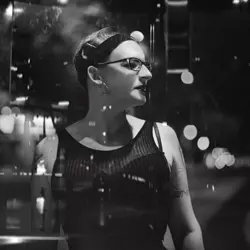 Simona Castricum
Simona CastricumThe concept album is important to techno music – Detroit's Jeff Mills transforming it into a sub-genre. With the narrative Panic/Desire, Melbourne DJ/artist/academic Simona Castricum soundtracks her movements through the metropolis, and urban spaces, as a gender nonconforming person – senses constantly heightened.
Integral to Panic/Desire is paradox. Castricum's experience of the pulsing nocturnal city brings the potential freedom of community, care and celebration found in the underground queer club, but also unease as she encounters arbitrary menace in its surrounds – a confrontational hostility pervasive in both real life and virtual realms. Castricum's journey is an instinctive process of hyper-navigation (cue The Present with her incisive rap).
But, while cerebral, Panic/Desire is ultimately emotionally transportive. And the album is more techno in spirit than sonically (mind, Borderline Spaces comes close to rave). Instead Castricum connects to synth-pop with its evocative melodies and epic builds and beats. Indeed, Castricum casts back to the New Wave and New Romantic (sub-) cultures with such artists as Visage, Eurythmics and Depeche Mode – '80s electro-pop not coincidentally defined by gender fluidity and the reclamation of narratives and collective memory.
Panic/Desire opens with the texturally cinematic GNC City. Let Myself Be is an anthem of self, with Castricum's resounding vocals and industrial sound design. The tuneful The Half Light is necessarily ambiguous. Castricum's live collaborator m8riarchy sings on the layered Supertouch, with distant guitar – a bop. The Good In You merges lush synthwave and expressive vocalising with ricochetting percussion.
Panic/Desire is inclusive art for now and the future.















